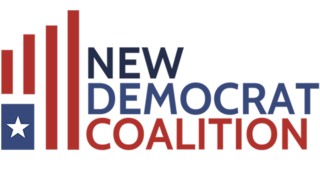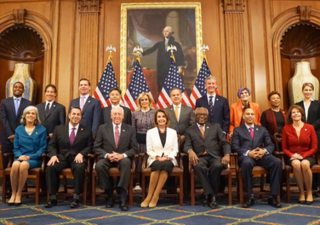
The Congressional Black Caucus (CBC) is a caucus made up of most African-American members of the United States Congress. Representative Karen Bass from California chaired the caucus from 2019 to 2021, she was succeeded by Representative Joyce Beatty from Ohio as chair. As of 2021, all members of the caucus are part of the Democratic Party.

The New Democrat Coalition is a caucus in the House of Representatives of the United States Congress made up of centrist Democrats who take a pro-business stance and a moderate-to-conservative approach to fiscal matters.

The Congressional Progressive Caucus (CPC) is a congressional caucus affiliated with the Democratic Party in the United States Congress. The CPC represents the most left-leaning faction of the Democratic Party. It was founded in 1991 and has grown since then.
In the United States House of Representatives, the two major political parties maintain policy and steering committees. Their primary purpose is to assign fellow party members to other House committees, and they also advise party leaders on policy.

The Congressional Taiwan Caucus is the largest Congressional Member Organization in the United States Congress with 229 members. The caucus focuses exclusively on improving American–Taiwanese relations.

The Congressional Motorcycle Safety Caucus is a bipartisan caucus of the United States House of Representatives.
The U.S. Congressional International Conservation Caucus, founded in September 2003, is a bipartisan congressional organization with the conviction that “the United States of America has the opportunity, the obligation and the interests to advance the conservation of natural resources for this and future generations,” and a commitment to promote U.S. leadership in public/private conservation partnerships worldwide.
The Labor Caucus of the United States was founded in November 2020 with the aim of expanding labor union power in the United States. The caucus supports measures such as the Protecting the Right to Organize Act that would expand union participation and make forming unions easier.
The Republican Governance Group, originally the Tuesday Lunch Bunch and then the Tuesday Group until 2020, is a group of moderate Republicans in the United States House of Representatives. It was founded in 1994 in the wake of the Republican takeover of the House; the Republican House caucus came to be dominated by conservatives.
The Congressional NextGen 9-1-1 Caucus, a United States Congress caucus,works to improve the 9-1-1 phone system and emergency response systems. The caucus is headed by Senators Richard Burr (R-NC) and Amy Klobuchar (D-MN) and Representatives Dan Bishop (R-NC) and Anna Eshoo (D-CA).

The House Baltic Caucus is a bipartisan registered Caucus of the House of Representatives since its inception in 1997 and is composed of members from both the Democratic and Republican Parties. The members of the House Baltic Caucus have a strong interest in promoting opportunities to strengthen the economic, political, and cultural relationships of the United States of America with Estonia, Latvia, and Lithuania.

The Congressional Ukraine Caucus is a bipartisan caucus of the United States House of Representatives that was announced in June 1997 in Washington, D.C., nearly six years after Ukraine declared its independence. Its mission is "organize an association of Members of Congress who share a common concern for building stronger bilateral relations between Ukraine and the United States." With the cooperation with the Ukrainian American community, the Caucus serves to lend support for Ukraine, beginning with democratization efforts and market-oriented reforms, and functions as a source of information for Members of Congress regarding events in Ukraine.

The Congressional Arts Caucus is a registered Congressional Member Organization for the US House of Representatives in the 115th Congress.
The U.S.–Japan Caucus is a bipartisan Congressional Member Organization within the United States Congress made up of over 100 members of the United States House of Representatives who work to strengthen and maintain U.S.–Japanese Relations.

The Congressional Veterinary Medicine Caucus is a Congressional Member Organization within the United States Congress and is officially recognized by the Committee on House Administration.

The Congressional Constitution Caucus is a congressional caucus made up of 41 members of the United States Congress. The caucus was founded in 2005; it had 37 members the first year it was founded.

A leadership election was held by the United States House of Representatives Democratic Caucus before the beginning of the 116th United States Congress on January 3, 2019. The election determined who will be nominated by the caucus for the speakership election as well as who would occupy other leadership positions within the House Democratic Caucus. The following positions were nominated or elected on November 29: Speaker of the U.S. House of Representatives, House Majority Leader, House Majority Whip, House Assistant Majority Leader, Democratic Caucus Chair, and Democratic Caucus Vice Chair. The Democratic Congressional Campaign Committee Chair, the Policy and Communications Committee's Chair and its three Co-Chairs, Junior Caucus Representative and Freshman Class Representative were elected the next day, and a third co-chair was added to the Steering and Policy Committee by the Leader.

Future Forum is a generational caucus of young Members of Congress serving in the U.S. House of Representatives. Future Forum is chaired by Representative Darren Soto in the 117th Congress. The organization was founded in April 2015 by Representative Eric Swalwell. The caucus consists of 37 Members of Congress who represent congressional districts across the country. Future Forum's vice-chairs are Representatives Colin Allred, Haley Stevens and Sara Jacobs.






